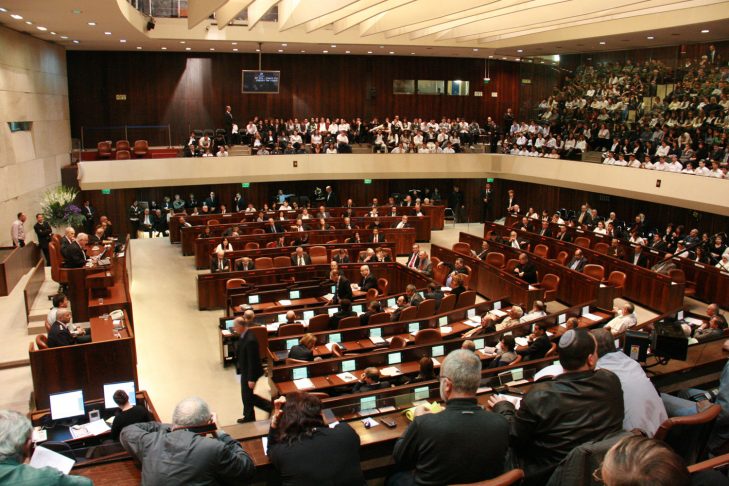Israelis have emerged from their fourth parliamentary election in two years, the result of a recurring inability to produce and sustain governing Knesset coalitions. It is not certain that the concluded March 23 election will yield more longevity or stability than the previous three attempts.
The idiosyncrasies of Israeli politics and this ongoing impasse has reminded me of a visit I made to the Knesset in July 2003 with my brother, Amir Afsai, during which we observed a parliamentary debate about the government’s long-delayed plan to construct a security barrier (geder hafrada in Hebrew) in Judea and Samaria/the West Bank.
Curiously, questions about this barrier—a network of fences, ditches, dirt mounds, and concrete walls intended to help prevent attacks by Palestinian gunmen and suicide bombers—also revolved that summer around the meaning and significance of the poetry of Robert Frost (1874-1963).
The speaker of Frost’s 1914 poem “Mending Wall” describes a yearly spring ritual in which he and his neighbor together repair the stone wall separating their farmlands. The neighbor is adamant about the need for this annual work, twice repeating the phrase, “Good fences make good neighbors.”
The poem’s speaker, though, is less certain than his neighbor about the goodness of fences. He twice repeats his conviction that walls are contrary to nature: “Something there is that doesn’t love a wall.” As neither he nor his neighbor have grazing animals, the speaker is insulted by the insistence on an unneeded separation between them. He wonders: “Why do they make good neighbors? Isn’t it/Where there are cows? But here there are no/cows./Before I built a wall I’d ask to know/What I was walling in or walling out,/And to whom I was like to give offence.”
By the end of the poem, the speaker views his wall-repairing neighbor as dangerously uncivilized and unenlightened: “I see him there/Bringing a stone grasped firmly by the top/In each hand, like an old-stone savage armed./He moves in darkness as it seems to me/Not of woods only and the shades of trees.”
The first Knesset member my brother and I heard referring to “Mending Wall” on the day we visited was Yuli-Yoel Edelstein, a famous refusenik and Likud party member (and more recently, from 2013 to 2020, speaker of the Knesset), who expressed his hesitancy about constructing the barrier. Before cementing his argument, he turned to an analysis of Frost’s poem and a lamenting of Israeli illiteracy:
“I just want to call here to the Minister of Education and the Chairman of the Knesset Committee on Education…and to say that the debate over the fence requires all of us to once again examine, Mr. Chairman, the issue of reading comprehension in Israel, because at least three or four times I have heard it said as an argument in support of the fence—by educated people, apparently—that even Robert Frost wrote: ‘Good fences make good neighbors.’ If I hear this once more, Mr. Chairman, I do not know—I will apparently demand a parliamentary committee on reading comprehension.”
Edelstein continued, explaining the reason for his ire: “They only forget to mention that the one who says these words is the ‘anti-hero,’ the antagonist of that poem by Frost, that hero with whom the poet is in constant debate. Apparently, Robert Frost claims, as we heard just now from the friend of Israel, Tom DeLay, that a good fence does not make good neighbors, but only peace—the fervent desire for peace on both sides—makes good neighbors.”
Overall, Edelstein provided a correction to the way the poem was being misused in political discussions—but for his addition that in “Mending Wall” Frost was arguing that “the fervent desire for peace on both sides” is what “makes good neighbors.” Frost does not offer a key to what makes peace between people. The poem presents the complex idea that there may be both benefits and consequences to putting up barriers, depending on the circumstances, and therefore people should consider what they are “walling in or walling out.”
In any case, maybe Edelstein ought to have also contemplated a parliamentary committee on active listening. Shortly after his speech, Amram Mitzna of the Labor party, a retired general, rose to declare that he was in favor of the barrier, mustering “Mending Wall” to his cause. He also demonstrated that he had neither read Frost’s poem nor listened to a word Edelstein had just said.
The left-leaning but security-minded Mitzna declared: “It is true that in the world-view I represent, the intention is to separate from the Palestinians and allow the establishment of a Palestinian state. Even in times of peace a fence will be needed, for there is no neighborliness without a fence. This was said before me, of course, by Robert Frost.”
As someone with a literature background, it was interesting to see an American poem assume such prominence in an ongoing Israeli political debate and to hear it quoted in a parliamentary session. But I also wondered why anyone believed that several dozen lines by an American farmer-writer waxing poetic about his interactions with his neighbor on their idyllic New England farmlands ought to carry weight in discussions about whether or not to build a barrier between two rival Middle Eastern nations. If Frost lived adjacent to people with whom he was in a religious and national conflict, he might have written a different poem.
Perhaps feeling that Israel’s life-and-death security decisions should be grounded less in early 20th-century American poetry than in biblical exegesis, Rabbi Nissim Ze’ev of the religious Sephardi Shas party put aside Frost and instead turned to the Book of Numbers as part of an impassioned plea to build the barrier.
Ze’ev spoke about the role of Balaam’s donkey in preventing its owner from cursing the Israelites as they prepared to enter the Promised Land: “I am puzzled about many Knesset members who do not understand the indispensability of a fence. Even Balaam’s donkey understood and agreed that in order to block Balaam, his hatred for the nation of Israel, he must be taken and placed between walls—a wall on either side. Then they managed to block Balaam.”
But it so happens that in the biblical narrative the donkey’s pressing of Balaam between two walls fails to hinder him from trying to harm the nation of Israel—he was hired to curse the Israelites by the Moabite King Balak—and therefore an armed angel reveals itself and directly addresses the wicked man.
The erudite and staunchly secular Yossi Sarid of the left-wing Meretz party lost no time in pointing out the rabbi’s error: “Knesset member Nissim Ze’ev spoke about Balaam, the wall, the donkey and Balak—that is, I add that, because he spoke about Balaam. And it turns out for the who-knows-how-many-time that he did not comprehend at all what was read. I suggest you read again the story of Balak, Balaam and the donkey, and then you will understand that you do not understand even this. It is exactly the opposite of what you said, but it is a shame to waste time on this.”
A positive way to look at such parliamentary discussions is to see them as signs of Jewish reverence for texts—the belief that answers to life’s greatest questions may be found in literature. Maybe, in the case of Frost, this turning to American poetry is also indicative of Israelis’ ongoing need to justify their state’s existence and actions to the nations of the world—a task more easily accomplished using non-Jewish literary vocabularies, and an approach that then spills over into internal parliamentary discussions. Then again, perhaps the focus on Frost also reveals a decrease in shared Jewish vocabulary among Israelis. And when even a learned rabbi in the Knesset misreads a basic biblical text, what can reasonably be expected of its other members’ Jewish literacy?
For more by Shai Afsai on Israel and Zionism, see here.
This post has been contributed by a third party. The opinions, facts and any media content are presented solely by the author, and JewishBoston assumes no responsibility for them. Want to add your voice to the conversation? Publish your own post here. MORE



